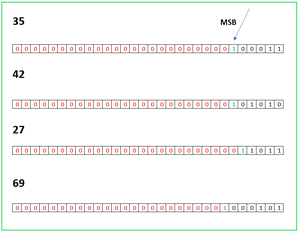从给定的数组中找到所有无序对的 XNOR 和
给定一个大小为N的数组arr[] ,任务是从给定数组中找到所有可能的无序对的所有 XNOR 值的总和。
例子:
Input: N = 5, arr[] = {2, 2, 2, 1, 1}
Output:10
Explanation: Here,
2 XNOR 2 = 3, 2 XNOR 2 = 3, 2 XNOR 2 = 3, 1 XNOR 1 = 1, 2 XNOR 1 = 0, 2 XNOR 1 = 0, 2 XNOR 1 = 0, 2 XNOR 1 = 0, 2 XNOR 1 = 0, 2 XNOR 1 = 0, Therefore sum is 3+3+3+1=10.
Input: N = 3, arr[] = {1, 2, 3}
Output: 3
Explanation: Here, 1 XNOR 2 = 0, 1 XNOR 3 = 1, 2 XNOR 3 = 2. Therefore sum is 0+1+2 = 3
方法:在 XNOR 操作之后设置位的唯一可能情况是两个位必须相同。请按照以下步骤解决问题:
- 维护一个大小为 30 的位数组。左起第 0位表示2^29包含在二进制表示中,从左起第 29位表示2^0包含在二进制表示中。
- 对于每个元素,如果设置了第 i 个位,则增加位数组的第 i 个位置。
- 遇到包含“1”的MSB后,计算“0”和“1”位。
- 在遇到“1”位之前,所有“0”位都将被浪费。分开存放。
- 最后,假设第 i 个位置有y 个个数。因此,对于具有(1, 1)位组合的第 i 位,有y*(y-1)/2对,结果1为XNOR 。另外,假设直到相同的位置有x 个零。因此,对于具有(0, 0)位组合的第 i 位,有y*(y-1)/2对,结果1为XNOR 。
- 现在对于前导零的情况,将浪费的位数乘以0 的位数。对每个位位置执行此操作并计算答案。
为了更好地理解,请考虑数组 {35, 42, 27, 69} 。这是数组的所有四个元素的二进制表示。

数组元素的二进制表示。
- 带箭头的单点是该元素的第一位,即 1。因此,它是该元素的最高有效位。同样,所有其他元素的MSB为绿色。
- 出现在 MSB 之前的零是浪费的位并以红色着色。这些二进制数组的大小各为 30。
- 在 bits 数组的前 23个位置中,浪费的位数为 4,1的数量为零, 0 的数量为零,如图所示。
- 在第 24 个位置,浪费的位是3 ,当在元素 69 的第 24 个元素处遇到 MSB 时, 1 的数量将为1 。
23rd bit: No. of wasted bits: 4, No. of 1’s: 0, No.of 0’s: 0
24th bit: No. of wasted bits: 3, No. of 1’s: 1, No.of 0’s: 0
25th bit: No. of wasted bits: 1, No. of 1’s: 2, No.of 0’s: 1 ( since it occurs after MSB )
26th bit: No. of wasted bits: 0, No. of 1’s: 1, No.of 0’s: 3
27th bit: No. of wasted bits: 0, No. of 1’s: 2, No.of 0’s: 2
28th bit: No. of wasted bits: 0, No. of 1’s: 1, No.of 0’s: 3
29th bit: No. of wasted bits: 0, No. of 1’s: 3, No.of 0’s: 1
30th bit: No. of wasted bits: 0, No. of 1’s: 3, No.of 0’s: 1
- 现在在这些位中的每一个中,对于任何一对位中的 XNOR 值都为1 ,要么两者都应该是1 ,要么都应该是0 。
- 对于两者都应该是 1 ,它有N[i]*(N[i]-1)/2对,其中N[i]是所有元素中第 i 个位置的 1 的数量。
- 同样,对于两者都应该是 0 ,它有M[i]*(M[i]-1)/2对,其中M[i]是所有元素中第 i 个位置的 0 的数量。因为所需的答案是所有可能性的总和。因此,对于第 i位,为所有可能的对添加2^(30-i-1) 。
- 如果两者都应为 0,则还要考虑在任何元素在浪费位的相同位置具有 0(非浪费)时发生的浪费位。让浪费的位为W[i] 。
- 所以总和 = (N[i]*(N[i]-1)/2)*(2^(30-i-1) + (M[i]*(M[i]-1)/2) *(2^(30-i-1) + (W[i]*M[i]*(2^(30-i-1)))其中 0<= i <=30。
- 所以,对于上面的例子,直到第 23 位,一切都是 0。从第 24 位开始在这里列出。
- 总计 = ((1*0)/2)*(2^6) + ((0*(-1))/2)*(2^6) + 3*0*(2^6) + ((2 *1)/2)*(2^5) + ((1*0)/2)*(2^5) + 1*1*(2^5) + ((1*0)/2)*( 2^4) + ((3*2)/2)*(2^4) + 0*3*(2^4) + ((2*1)/2)*(2^3) + ((2 *1)/2)*(2^3) + 0*2*(2^3) + ((1*0)/2)*(2^2) + ((3*2)/2)*( 2^2) + 0*3*(2^2) + ((3*2)/2)*(2^1) + ((1*0)/2)*(2^1) + 0*1 *(2^1) + ((3*2)/2)*(2^0) + ((1*0)/2)*(2^0) + 0*1*(2^0)
- 总计 = 0 + 0 + 0 + 32 + 0 + 32 + 0 + 48 + 0 + 8 + 8 + 0 + 0 + 12 + 0 + 6 + 0 + 0 + 3 + 0 + 0
- 因此,总和 = 149
下面是上述方法的实现。
Python3
# Python program for the above approach
# Function to find the required sum
def findSum(n, r):
# Store the result
result = 0
# bits[i][0] and bits[i][1] has
# count of all 1's and 0's in the
# ith bit of all elements respectively
# bits[i][2] has count of wasted zeroes
# of ith bit for all elements
bits = [[0, 0, 0] for i in range(30)]
# Iterating through all elements
for i in r:
# Converting element to binary
binary = bin(i)[2:]
# zfill adds zeros to the front
binary = binary.zfill(30)
# Flag variable set to 1 after
# first occurence of 1 (MSB)
flag = 0
# Iterating through all the bits
for j in range(30):
# If msb not found
if(flag == 0):
# Msb found
if(binary[j] == '1'):
# Set flag to 1
flag = 1
# Incrementing number
# of 1's in jth bit
bits[j][0] += 1
# If msb not found yet
else:
# Incrementing number of
# wasted zeroes before msb
bits[j][2] += 1
# Continue till msb is encountered
continue
# Incrementing number
# of 1's in jth bit
if(binary[j] == '1'):
bits[j][0] += 1
# Incrementing number
# of 0's in jth bit
else:
bits[j][1] += 1
# Iterating through all bits
for i in range(30):
# Total number of 1's in
# ith bit of all elements
y = bits[i][0]
# Total number of 0's in
# ith bit of all elements
x = bits[i][1]
# Total number of wasted 0's
# before msb of ith bit of all elements
msboff = bits[i][2]
# y*(y-1)/2 pairs for ith bit has (1, 1)
# bit combo which gives result 1 in XNOR
onePairs = (y*(y-1))//2
# Adding value of ith
# bit number of (1, 1) pairs
# times to result
# (2^(30-i-1) => 2 ^ 29, 2 ^ 28 etc.
result += onePairs * pow(2, 30-i-1)
# x*(x-1)/2 pairs for ith bit has (0, 0)
# bit combo which gives result 1 in XNOR
zeroPairs = ((x*(x-1))//2)
# Adding value of ith bit
# number of (0, 0) pairs
# times to result
# (2^(30-i-1) => 2 ^ 29, 2 ^ 28 etc.)
result += zeroPairs * pow(2, 30-i-1)
# Same for leading zeroes
result += (msboff * x)*pow(2, 30-i-1)
return result
# Driver code
if __name__ == '__main__':
n = 5
r = [2, 2, 2, 1, 1]
print(findSum(n, r))Javascript
10时间复杂度:O(30*N)
辅助空间: O(1)